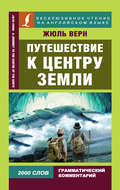
Жюль Верн
From the Earth to the Moon, Direct in Ninety-Seven Hours and Twenty Minutes: and a Trip Round It
CHAPTER XIX.
A MONSTER MEETING
On the following day Barbicane, fearing that indiscreet questions might be put to Michel Ardan, was desirous of reducing the number of the audience to a few of the initiated, his own colleagues for instance. He might as well have tried to check the Falls of Niagara! He was compelled, therefore, to give up the idea, and to let his new friend run the chances of a public conference. The place chosen for this monster meeting was a vast plain situated in the rear of the town. In a few hours, thanks to the help of the shipping in port, an immense roofing of canvas was stretched over the parched prairie, and protected it from the burning rays of the sun. There 300,000 people braved for many hours the stifling heat while awaiting the arrival of the Frenchman. Of this crowd of spectators a first set could both see and hear; a second set saw badly and heard nothing at all; and as for the third, it could neither see nor hear anything at all. At three o'clock Michel Ardan made his appearance, accompanied by the principal members of the Gun Club. He was supported on his right by President Barbicane, and on his left by J. T. Maston, more radiant than the midday sun and nearly as ruddy. Ardan mounted a platform, from the top of which his view extended over a sea of black hats. He exhibited not the slightest embarrassment; he was just as gay, familiar, and pleasant as if he were at home. To the hurrahs which greeted him he replied by a graceful bow; then, waving his hand to request silence, he spoke in perfectly correct English as follows: —
"Gentlemen, despite the very hot weather I request your patience for a short time while I offer some explanations regarding the projects which seem to have so interested you. I am neither an orator nor a man of science, and I had no idea of addressing you in public; but my friend Barbicane has told me that you would like to hear me, and I am quite at your service. Listen to me, therefore, with your 600,000 ears, and please to excuse the faults of the speaker. Now pray do not forget that you see before you a perfect ignoramus whose ignorance goes so far that he cannot even understand the difficulties! It seemed to him that it was a matter quite simple, natural, and easy to take one's place in a projectile and start for the moon! That journey must be undertaken sooner or later; and, as for the mode of locomotion adopted, it follows simply the law of progress. Man began by walking on all-fours; then, one fine day, on two feet; then in a carriage; then in a stage-coach; and lastly by railway. Well, the projectile is the vehicle of the future, and the planets themselves are nothing else! Now some of you, gentlemen, may imagine that the velocity we propose to impart to it is extravagant. It is nothing of the kind. All the stars exceed it in rapidity, and the earth herself is at this moment carrying us round the sun at three times as rapid a rate, and yet she is a mere lounger on the way compared with many others of the planets! And her velocity is constantly decreasing. Is it not evident, then, I ask you, that there will some day appear velocities far greater than these, of which light or electricity will probably be the mechanical agent?
"Yes, gentlemen," continued the orator, "in spite of the opinions of certain narrow-minded people, who would shut up the human race upon this globe, as within some magic circle which it must never outstep, we shall one day travel to the moon, the planets, and the stars, with the same facility, rapidity, and certainty as we now make the voyage from Liverpool to New York! Distance is but a relative expression, and must end by being reduced to zero."
The assembly, strongly predisposed as they were in favour of the French hero, were slightly staggered at this bold theory. Michel Ardan perceived the fact.
"Gentlemen," he continued with a pleasant smile, "you do not seem quite convinced. Very good! Let us reason the matter out. Do you know how long it would take for an express train to reach the moon? Three hundred days; no more! And what is that? The distance is no more than nine times the circumference of the earth; and there are no sailors or travellers, of even moderate activity, who have not made longer journeys than that in their lifetime. And now consider that I shall be only ninety-seven hours on my journey. Ah! I see you are reckoning that the moon is a long way off from the earth, and that one must think twice before making the experiment. What would you say, then, if we were talking of going to Neptune, which revolves at a distance of more than two thousand seven hundred and twenty millions of miles from the sun! And yet what is that compared with the distance of the fixed stars, some of which, such as Arcturus, are at billions of miles distant from us? And then you talk of the distance which separates the planets from the sun! And there are people who affirm that such a thing as distance exists. Absurdity, folly, idiotic nonsense! Would you know what I think of our own solar universe? Shall I tell you my theory? It is very simple! In my opinion the solar system is a solid, homogeneous body; the planets which compose it are in actual contact with each other; and whatever space exists between them is nothing more than the space which separates the molecules of the densest metal, such as silver, iron, or platinum! I have the right, therefore, to affirm, and I repeat, with the conviction which must penetrate all your minds, 'Distance is but an empty name; distance does not really exist!'"
"Hurrah!" cried one voice (need it be said it was that of J. T. Maston?). "Distance does not exist!" And overcome by the energy of his movements, he nearly fell from the platform to the ground. He just escaped a severe fall, which would have proved to him that distance was by no means an empty name.
"Gentlemen," resumed the orator, "I repeat that the distance between the earth and her satellite is a mere trifle, and undeserving of serious consideration. I am convinced that before twenty years are over one half of our earth will have paid a visit to the moon. Now, my worthy friends, if you have any question to put to me, you will, I fear, sadly embarrass a poor man like myself; still I will do my best to answer you."
Up to this point the President of the Gun Club had been satisfied with the turn which the discussion had assumed. It became now, however, desirable to divert Ardan from questions of a practical nature, with which he was doubtless far less conversant. Barbicane, therefore, hastened to get in a word, and began by asking his new friend whether he thought that the moon and the planets were inhabited.
"You put before me a great problem, my worthy President," replied the orator, smiling. "Still, men of great intelligence, such as Plutarch, Swedenborg, Bernardin de St. Pierre, and others have, if I mistake not, pronounced in the affirmative. Looking at the question from the natural philosopher's point of view, I should say that nothing useless existed in the world; and, replying to your question by another, I should venture to assert, that if these worlds are habitable, they either are, have been, or will be inhabited."
"No one could answer more logically or fairly," replied the president. "The question then reverts to this: Are these worlds habitable? For my own part I believe they are."
"For myself, I feel certain of it," said Michel Ardan.
"Nevertheless," retorted one of the audience, "there are many arguments against the habitability of the worlds. The conditions of life must evidently be greatly modified upon the majority of them. To mention only the planets, we should be either broiled alive in some, or frozen to death in others, according as they are more or less removed from the sun."
"I regret," replied Michel Ardan, "that I have not the honour of personally knowing my contradictor, for I would have attempted to answer him. His objection has its merits, I admit; but I think we may successfully combat it, as well as all others which affect the habitability of the other worlds. If I were a natural philosopher, I would tell him that if less of caloric were set in motion upon the planets which are nearest to the sun, and more, on the contrary, upon those which are farthest removed from it, this simple fact would alone suffice to equalize the heat, and to render the temperature of those worlds supportable by beings organized like ourselves. If I were a naturalist, I would tell him that, according to some illustrious men of science, nature has furnished us with instances upon the earth of animals existing under very varying conditions of life; that fish respire in a medium fatal to other animals; that amphibious creatures possess a double existence very difficult of explanation; that certain denizens of the seas maintain life at enormous depths, and there support a pressure equal to that of fifty or sixty atmospheres without being crushed; that several aquatic insects, insensible to temperature, are met with equally among boiling springs and in the frozen plains of the Polar Sea; in fine, that we cannot help recognizing in nature a diversity of means of operation oftentimes incomprehensible, but not the less real. If I were a chemist, I would tell him that the aerolites, bodies evidently formed exteriorly of our terrestrial globe, have, upon analysis, revealed indisputable traces of carbon, a substance which owes its origin solely to organized beings, and which, according to the experiments of Reichenbach, must necessarily itself have been endued with animation. And lastly, were I a theologian, I would tell him that the scheme of the Divine Redemption, according to St. Paul, seems to be applicable, not merely to the earth, but to all the celestial worlds. But, unfortunately I am neither theologian, nor chemist, nor naturalist, nor philosopher; therefore, in my absolute ignorance of the great laws which govern the universe, I confine myself to saying in reply, 'I do not know whether the worlds are inhabited or not; and since I do not know, I am going to see!"
Whether Michel Ardan's antagonist hazarded any further arguments or not it is impossible to say, for the uproarious shouts of the crowd would not allow any expression of opinion to gain a hearing. On silence being restored, the triumphant orator contented himself with adding the following remarks: —
"Gentlemen, you will observe that I have but slightly touched upon this great question. There is another altogether different line of arguments in favour of the habitability of the stars, which I omit for the present. I only desire to call attention to one point. To those who maintain that the planets are not inhabited one may reply: – You might be perfectly in the right, if you could only show that the earth is the best possible world, spite of what Voltaire has said. She has but one satellite, while Jupiter, Uranus, Saturn, Neptune have each several, an advantage by no means to be despised. But that which renders our own globe so uncomfortable is the inclination of its axis to the plane of its orbit. Hence the inequality of days and nights; hence the disagreeable diversity of the seasons. On the surface of our unhappy spheroid we are always either too hot or too cold; we are frozen in winter, broiled in summer; it is the planet of rheumatism, coughs, bronchitis; while on the surface of Jupiter, for example, where the axis is but slightly inclined, the inhabitants may enjoy uniform temperatures. It possesses zones of perpetual springs, summers, autumns, and winters; every Jovian may choose for himself what climate he likes, and there spend the whole of his life in security from all variations of temperature. You will, I am sure, readily admit this superiority of Jupiter over our own planet, to say nothing of his years, which each equal twelve of ours! Under such auspices, and such marvellous conditions of existence, it appears to me that the inhabitants of so fortunate a world must be in every respect superior to ourselves. All we require, in order to attain to such perfection, is the mere trifle of having an axis of rotation less inclined to the plane of its orbit!"
"Hurrah!" roared an energetic voice, "let us unite our efforts, invent the necessary machines, and rectify the earth's axis!"
A thunder of applause followed this proposal, the author of which was, of course, no other than J. T. Maston. And, in all probability, if the truth must be told, if the Yankees could only have found a point of application for it, they would have constructed a lever capable of raising the earth and rectifying its axis. It was just this deficiency which baffled these daring mechanicians.
CHAPTER XX.
ATTACK AND RIPOSTE
As soon as the excitement had subsided, the following words were heard uttered in a strong and determined voice: —
"Now that the speaker has favoured us with so much imagination, would he be so good as to return to his subject, and give us a little practical view of the question?"
All eyes were directed towards the person who spoke. He was a little dried-up man, of an active figure, with an American "goatee" beard. Profiting by the different movements in the crowd, he had managed by degrees to gain the front row of spectators. There, with arms crossed and stern gaze, he watched the hero of the meeting. After having put his question he remained silent, and appeared to take no notice of the thousands of looks directed towards himself, nor of the murmur of disapprobation excited by his words. Meeting at first with no reply, he repeated his question with marked emphasis, adding, "We are here to talk about the moon and not about the earth."
"You are right, sir," replied Michel Ardan; "the discussion has become irregular. We will return to the moon."
"Sir," said the unknown, "you pretend that our satellite is inhabited. Very good; but if Selenites do exist, that race of beings assuredly must live without breathing, for – I warn you for your own sake – there is not the smallest particle of air on the surface of the moon."
At this remark Ardan pushed up his shock of red hair; he saw that he was on the point of being involved in a struggle with this person upon the very gist of the whole question. He looked sternly at him in his turn and said, —
"Oh! so there is no air in the moon? And pray, if you are so good, who ventures to affirm that?"
"The men of science."
"Really?"
"Really."
"Sir," replied Michel, "pleasantry apart, I have a profound respect for men of science who do possess science, but a profound contempt for men of science who do not."
"Do you know any who belong to the latter category?"
"Decidedly. In France there are some who maintain that, mathematically, a bird cannot possibly fly; and others who demonstrate theoretically that fishes were never made to live in water."
"I have nothing to do with persons of that description, and I can quote, in support of my statement, names which you cannot refuse deference to."
"Then, sir, you will sadly embarrass a poor ignorant, who, besides, asks nothing better than to learn."
"Why, then, do you introduce scientific questions if you have never studied them?" asked the unknown somewhat coarsely.
"For the reason that 'he is always brave who never suspects danger.' I know nothing, it is true; but it is precisely my very weakness which constitutes my strength."
"Your weakness amounts to folly," retorted the unknown in a passion.
"All the better," replied our Frenchman, "if it carries me up to the moon."
Barbicane and his colleagues devoured with their eyes the intruder who had so boldly placed himself in antagonism to their enterprise. Nobody knew him, and the president, uneasy as to the result of so free a discussion, watched his new friend with some anxiety. The meeting began to be somewhat fidgety also, for the contest directed their attention to the dangers, if not the actual impossibilities, of the proposed expedition.
"Sir," replied Ardan's antagonist, "there are many and incontrovertible reasons which prove the absence of an atmosphere in the moon. I might say that, à priori, if one ever did exist, it must have been absorbed by the earth; but I prefer to bring forward indisputable facts."
"Bring them forward then, sir, as many as you please."
"You know," said the stranger, "that when any luminous rays cross a medium such as the air, they are deflected out of the straight line; in other words, they undergo refraction. Well! When stars are occulted by the moon, their rays, on grazing the edge of her disc, exhibit not the least deviation, nor offer the slightest indication of refraction. It follows, therefore, that the moon cannot be surrounded by an atmosphere."
"In point of fact," replied Ardan, "this is your chief, if not your only argument; and a really scientific man might be puzzled to answer it. For myself, I will simply say that it is defective, because it assumes that the angular diameter of the moon has been completely determined, which is not the case. But let us proceed. Tell me, my dear sir, do you admit the existence of volcanoes on the moon's surface?"
"Extinct, yes! In activity, no!"
"These volcanoes, however, were at one time in a state of activity?"
"True! but, as they furnished themselves the oxygen necessary for combustion, the mere fact of their eruption does not prove the presence of an atmosphere."
"Proceed again, then; and let us set aside this class of arguments in order to come to direct observations. In 1715 the astronomers Louville and Halley, watching the eclipse of the 3rd May, remarked some very extraordinary scintillations. These jets of light, rapid in nature, and of frequent recurrence, they attributed to thunderstorms generated in the lunar atmosphere."
"In 1715," replied the unknown, "the astronomers Louville and Halley mistook for lunar phenomena some which were purely terrestrial, such as meteoric or other bodies which are generated in our own atmosphere. This was the scientific explanation at the time of the facts; and that is my answer now."
"On again, then," replied Ardan; "Herschel, in 1787, observed a great number of luminous points on the moon's surface, did he not?"
"Yes! but without offering any solution of them. Herschel himself never inferred from them the necessity of a lunar atmosphere. And I may add that Bœer and Moedler, the two great authorities upon the moon, are quite agreed as to the entire absence of air on its surface."
A movement was here manifest among the assemblage, who appeared to be growing excited by the arguments of this singular personage.
"Let us proceed," replied Ardan, with perfect coolness, "and come to one important fact. A skilful French astronomer, M. Laussedat, in watching the eclipse of July 18, 1860, proved that the horns of the solar crescent were rounded and truncated. Now, this appearance could only have been produced by a deviation of the solar rays in traversing the atmosphere of the moon. There is no other possible explanation of the fact."
"But is this established as a fact?"
"Absolutely certain!"
A counter-movement here took place in favour of the hero of the meeting, whose opponent was now reduced to silence. Ardan resumed the conversation; and without exhibiting any exultation at the advantage he had gained, simply said, —
"You see, then, my dear sir, we must not pronounce with absolute positiveness against the existence of an atmosphere in the moon. That atmosphere is, probably, of extreme rarity; nevertheless at the present day science generally admits that it exists."
"Not in the mountains, at all events," returned the unknown, unwilling to give in.
"No! but at the bottom of the valleys, and not exceeding a few hundred feet in height."
"In any case you will do well to take every precaution, for the air will be terribly rarified."
"My good sir, there will always be enough for a solitary individual; besides, once arrived up there, I shall do my best to economize, and not to breathe except on grand occasions!"
A tremendous roar of laughter rang in the ears of the mysterious interlocutor, who glared fiercely round upon the assembly.
"Then," continued Ardan, with a careless air, "since we are in accord regarding the presence of a certain atmosphere, we are forced to admit the presence of a certain quantity of water. This is a happy consequence for me. Moreover, my amiable contradictor, permit me to submit to you one further observation. We only know one side of the moon's disc; and if there is but little air on the face presented to us, it is possible that there is plenty on the one turned away from us."
"And for what reason?"
"Because the moon, under the action of the earth's attraction, has assumed the form of an egg, which we look at from the smaller end. Hence it follows, by Hausen's calculations, that its centre of gravity is situated in the other hemisphere. Hence it results that the great mass of air and water must have been drawn away to the other face of our satellite during the first days of its creation."
"Pure fancies!" cried the unknown.
"No! Pure theories! which are based upon the laws of mechanics, and it seems difficult to me to refute them. I appeal then to this meeting, and I put it to them whether life, such as exists upon the earth, is possible on the surface of the moon?"
Three hundred thousand auditors at once applauded the proposition. Ardan's opponent tried to get in another word, but he could not obtain a hearing. Cries and menaces fell upon him like hail.
"Enough! enough!" cried some.
"Drive the intruder off!" shouted others.
"Turn him out!" roared the exasperated crowd.
But he, holding firmly on to the platform, did not budge an inch, and let the storm pass on, which would soon have assumed formidable proportions, if Michel Ardan had not quieted it by a gesture. He was too chivalrous to abandon his opponent in an apparent extremity.
"You wished to say a few more words?" he asked, in a pleasant voice.
"Yes, a thousand; or rather, no, only one! If you persevere in your enterprise, you must be a – "
"Very rash person! How can you treat me as such? me, who have demanded a cylindro-conical projectile, in order to prevent turning round and round on my way like a squirrel?"
"But, unhappy man, the dreadful recoil will smash you to pieces at your starting."
"My dear contradictor, you have just put your finger upon the true and the only difficulty; nevertheless, I have too good an opinion of the industrial genius of the Americans not to believe that they will succeed in overcoming it."
"But the heat developed by the rapidity of the projectile in crossing the strata of air?"
"Oh! the walls are thick, and I shall soon have crossed the atmosphere."
"But victuals and water?"
"I have calculated for a twelvemonth's supply, and I shall be only four days on the journey."
"But for air to breathe on the road?"
"I shall make it by chemical process."
"But your fall on the moon, supposing you ever reach it?"
"It will be six times less dangerous than a sudden fall upon the earth, because the weight will be only one-sixth as great on the surface of the moon."
"Still it will be enough to smash you like glass!"
"What is to prevent my retarding the shock by means of rockets conveniently placed, and lighted at the right moment?"
"But after all, supposing all difficulties surmounted, all obstacles removed, supposing everything combined to favour you, and granting that you may arrive safe and sound in the moon, how will you come back?"
"I am not coming back!"
At this reply, almost sublime in its very simplicity, the assembly became silent. But its silence was more eloquent than could have been its cries of enthusiasm. The unknown profited by the opportunity and once more protested, —
"You will inevitably kill yourself!" he cried; "and your death will be that of a madman, useless even to science!"
"Go on, my dear unknown, for truly your prophecies are most agreeable!"
"It really is too much!" cried Michel Ardan's adversary. "I do not know why I should continue so frivolous a discussion! Please yourself about this insane expedition! We need not trouble ourselves about you!"
"Pray don't stand upon ceremony!"
"No! another person is responsible for your act."
"Who, may I ask?" demanded Michel Ardan in an imperious tone.
"The ignoramus who organized this equally absurd and impossible experiment!"
The attack was direct. Barbicane, ever since the interference of the unknown, had been making fearful efforts of self-control; now, however, seeing himself directly attacked, he could restrain himself no longer. He rose suddenly, and was rushing upon the enemy who thus braved him to the face, when all at once he found himself separated from him.
The platform was lifted by a hundred strong arms, and the President of the Gun Club shared with Michel Ardan triumphal honours. The shield was heavy, but the bearers came in continuous relays, disputing, struggling, even fighting among themselves in their eagerness to lend their shoulders to this demonstration.
However, the unknown had not profited by the tumult to quit his post. Besides he could not have done it in the midst of that compact crowd. There he held on in the front row with crossed arms, glaring at President Barbicane.
The shouts of the immense crowd continued at their highest pitch throughout this triumphant march. Michel Ardan took it all with evident pleasure. His face gleamed with delight. Several times the platform seemed seized with pitching and rolling like a weather-beaten ship. But the two heroes of the meeting had good sea-legs. They never stumbled; and their vessel arrived without dues at the port of Tampa Town.
Michel Ardan managed fortunately to escape from the last embraces of his vigorous admirers. He made for the Hotel Franklin, quickly gained his chamber, and slid under the bedclothes, while an army of a hundred thousand men kept watch under his windows.
During this time a scene, short, grave, and decisive, took place between the mysterious personage and the President of the Gun Club.
Barbicane, free at last, had gone straight at his adversary.
"Come!" he said shortly.
The other followed him on to the quay; and the two presently found themselves alone at the entrance of an open wharf on Jones' Fall.
The two enemies, still mutually unknown, gazed at each other.
"Who are you?" asked Barbicane.
"Captain Nicholl!"
"So I suspected. Hitherto chance has never thrown you in my way."
"I am come for that purpose."
"You have insulted me."
"Publicly!"
"And you will answer to me for this insult?"
"At this very moment."
"No! I desire that all that passes between us shall be secret. There is a wood situated three miles from Tampa, the wood of Skersnaw. Do you know it?"
"I know it."
"Will you be so good as to enter it to-morrow morning at five o'clock, on one side?"
"Yes! if you will enter at the other side at the same hour."
"And you will not forget your rifle?" said Barbicane.
"No more than you will forget yours," replied Nicholl.
These words having been coldly spoken, the President of the Gun Club and the captain parted. Barbicane returned to his lodging; but instead of snatching a few hours of repose, he passed the night in endeavouring to discover a means of evading the recoil of the projectile, and resolving the difficult problem proposed by Michel Ardan during the discussion at the meeting.






